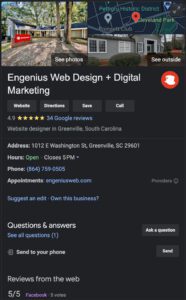Your local business has all the tools it needs for effective small business SEO.
SEO isn’t just for enterprises and large companies — any business that targets the correct keywords and finds ways to reach its niche market can see increased traffic and conversions.
And the best news – you don’t have to overthink it.
Is All SEO the Same?
Search engine optimization strategies improve search engine rankings so that a company appears in more relevant searches. However, large enterprise businesses, ecommerce brands, and national businesses have different goals than small, local businesses.
Larger businesses have broader audiences, sometimes from around the world. So, when they perform SEO, they focus on search intent rather than location since anyone can be a customer.
Small local businesses won’t attract customers by reaching people in another country or even another state. Instead, local companies will see the best results when they target their community, so they show up in local searches.
An example of a local search would be “restaurants near me” where near me will pull restaurants closest to the user.
While local searches will bring in the most customers, any website traffic is beneficial…making SEO beneficial. If you can bring consistent traffic to your website, even if they don’t all turn into customers, you can boost your site’s authority. Having an authoritative site, in turn, increases your ranking in search results.
That’s why the best SEO for small businesses focuses on local SEO, but doesn’t neglect other organic ranking opportunities. Both are necessary and achievable even for startups and those with a minimal online presence.
5 Tactics for Powerful Local SEO for Small Businesses
There are hundreds of SEO strategies and tactics out there today – but many of them are overkill for small businesses. Focus on these five simple, yet effective SEO tips to get started with local SEO for your small business.

1. Don’t Overcomplicate Keywords
Keywords decide which search results your brand’s content appears in. Large businesses perform in-depth keyword research to identify new and unique ranking opportunities.
Thankfully, small businesses don’t need to go through the same lengths to reach their audience. Your audience is in your community. So, the best way to reach them is by targeting your service keywords plus your business’s location. No need to overthink it.
A Greenville salon may target the keywords “men’s haircuts in Greenville” and “women’s haircuts in Greenville.”
Location keywords are simple yet effective, as 46% of Google searches are location-based, and 80% of local searches end in a conversion.
2. Create Quality Service Pages
Your service pages will bring in those local searches, so make them stand out.
Your service pages should be informative and helpful. That way, Google sees your business as an authority for those services in your area. Because Google prioritizes authority sites, the algorithm is likelier to rank you higher in search results if your pages are trustworthy and exhibit expertise.
3. Strategically Place Your Keywords
Where do you put the local keywords you selected?
Keywords should be prominent in your online content. Some of the best places to add your service plus location keywords to improve SEO for business growth include:
- Page titles
- Headings throughout pages
- Page meta descriptions
- Customized URL text
- The first 100 words of every page

4. Set Up Your Google Business Profile
Google Business Profiles help your brand show up in local searches. When you fill out your profile, it will appear in the local map pack that appears for local searches – whether they use your town or “near me” in their search or not.
Your Business Profile is your storefront. You’ll want to complete it to make the most of this free tool. That includes critical contact information like your name, address, and phone number.
You should add enough information for your audience to find you and ensure the information is accurate. Then, when your data aligns across all your web profiles, from your business page to your website, Google will see you as more authoritative. An important note: if there are discrepancies, it could hurt your ranking.

5. Generate Plenty of Reviews
Reviews can boost your search engine ranking by showing a high engagement rate and building your website’s authority overall. In addition, the reviews show Google that your brand is reliable and attracts local customers.
Reviews also encourage more clicks as customers who see star ratings on ads and your page are more likely to click on your link and purchase products.
Set Yourself Up for SEO Success
SEO strategies improve search engine ranking for all businesses, whether large or small. Your audience is waiting for you to connect with them. Why not build a strong brand presence for your small business that attracts your desired results through local SEO?
Start the Conversation
Interested in learning more about how to increase sales by properly leveraging your website?



